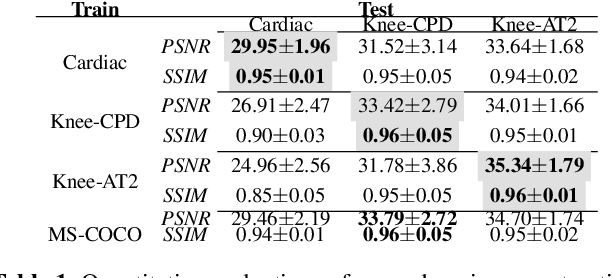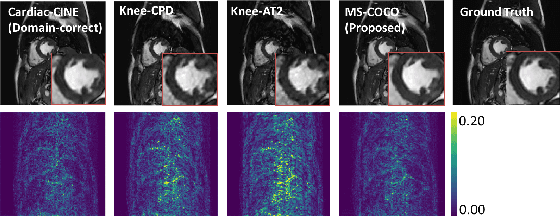Gavin Seegoolam
k-t NEXT: Dynamic MR Image Reconstruction Exploiting Spatio-temporal Correlations
Jul 22, 2019



Abstract:Dynamic magnetic resonance imaging (MRI) exhibits high correlations in k-space and time. In order to accelerate the dynamic MR imaging and to exploit k-t correlations from highly undersampled data, here we propose a novel deep learning based approach for dynamic MR image reconstruction, termed k-t NEXT (k-t NEtwork with X-f Transform). In particular, inspired by traditional methods such as k-t BLAST and k-t FOCUSS, we propose to reconstruct the true signals from aliased signals in x-f domain to exploit the spatio-temporal redundancies. Building on that, the proposed method then learns to recover the signals by alternating the reconstruction process between the x-f space and image space in an iterative fashion. This enables the network to effectively capture useful information and jointly exploit spatio-temporal correlations from both complementary domains. Experiments conducted on highly undersampled short-axis cardiac cine MRI scans demonstrate that our proposed method outperforms the current state-of-the-art dynamic MR reconstruction approaches both quantitatively and qualitatively.
Generalising Deep Learning MRI Reconstruction across Different Domains
Jan 31, 2019


Abstract:We look into robustness of deep learning based MRI reconstruction when tested on unseen contrasts and organs. We then propose to generalise the network by training with large publicly-available natural image datasets with synthesised phase information to achieve high cross-domain reconstruction performance which is competitive with domain-specific training. To explain its generalisation mechanism, we have also analysed patch sets for different training datasets.
 Add to Chrome
Add to Chrome Add to Firefox
Add to Firefox Add to Edge
Add to Edge